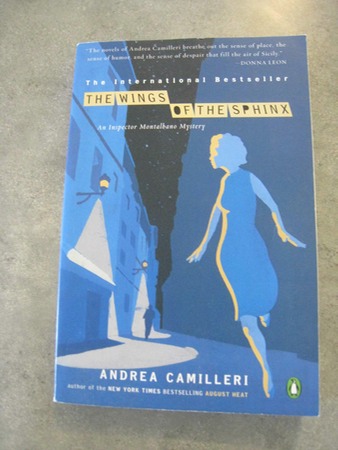Sunday, 10 October 2010

The August Heat rift between Salvo and Livia is a subplot throughout The Wings of the Sphinx, the eleventh book in the series as regular plot elements kick into action. The predictable morning phone call from Catarella reveals that this time the body that has been found is female rather than male, that Mimi Augello is already at the scene of the crime, and that it iss bitter if you go there, too, Chief, poisonally in poisson.
The naked body of an attractive young woman with half her face shot off dumped at an illegal dumping ground in a dry riverbed doesn't come with a whole lot of evidence about her identity apart from a sphinx moth tattooed on her left shoulder. Prosecutor Tommaseo has his own twisted interpretation of the way things went down, but things aren't going to be that simple.
There's the predictable conflict with the Commissioner, who's breathing down Montalbano's neck about the apparent kidnapping of a wealthy fifty-year-old businessman who seems to have disappeared for a discreet tryst in Cuba with an airline hostess.
Faced with the difficulty of identifying the victim, Montalbano enlists the assistance of Niccolo Zito and the Free Channel, which in turn produces enough leads to establish that the victim is one of a group of four Russian immigrants sporting the same tattoo brought to Italy to work as dancers and subsequently rescued from the night-club and casino circuit by a Catholic charity and retrained as housekeepers.
When Salvo starts investigating that connection there's the predictable outcry from the Church, the subsequent political pressure to steer the inquiry in a different direction and the added complication that the other three girls seem to have disappeared. The charity, as the reader probably surmised from the start, seems like a front for a larger scam, and as Montalbano sets about putting the pieces into place all these factors get in the way of arranging a discreet getaway to sort things out with Livia.